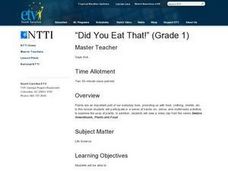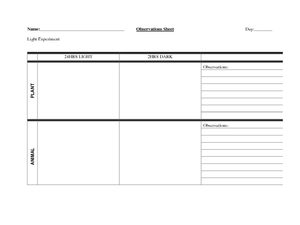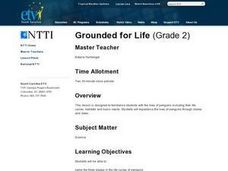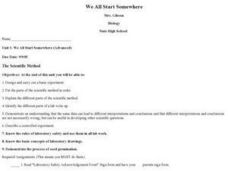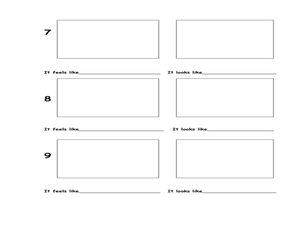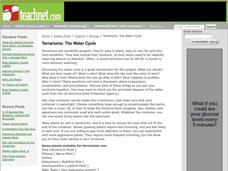Curated OER
Recyclers to the Rescue
Producers, consumers, food chains, and plants are the stars of this science lesson. Learners take part in an inquiry which helps them to discover the most effective and efficient way to grow a producer. They have a variety of containers...
Curated OER
Molecular Approaches to Evolution
Students are introduced to working with molecular data. The first activity does both simulated and original data are used to compare amino acid, protein or DNA differences to construct phylogenetic trees or cladograms. These activities...
Curated OER
"Did You Eat That!"
First graders investigate why plants are an important part of our everyday lives, providing us with food, clothing, shelter, etc. In this lesson plan students participate in a series of hands-on, online, and multimedia activities to...
Curated OER
Spring Migration, Milkweed Monitoring
Pupils watch for milkweed plants from the previous fall and choose several new plants to monitor. Then make observations and measurements about the plants. The connection with the weather is also made with the monitoring of temperature,...
Curated OER
Lesson 4, Spring Migration. Milkweed Monitoring
High schoolers monitor the growth of milkweed plants. The observations are made to help make conclusions about growth and development.
Curated OER
Global Warming--Points of view
Students are introduced to global warming through analysis of political/editorial cartoons dealing with the subject. They discuss the cartoon and what the feel it means and then discuss the mechanics of and the concerns about global...
Curated OER
Crickets on the Hearth
Learners investigate how crickets behave in cold temperatures. In this life science lesson, students explain the beneficial and harmful effect of pests. They research ways to properly manage them.
Curated OER
Changing How Things Look
Third graders use a literature study in order to investigate how organisms effect an ecosystem. They are asked questions about change taken from the book. Students also take a nature walk to make field observations.
Curated OER
Organisms – Their Needs
Students compare and contrast different organisms characteristics. In this life science lesson, students design an experiment about plants and animals needs. They collect data and write their conclusion about the experiment.
Curated OER
Grounded for Life
Second graders become familiar with the lives of penguins including their life cycles, habitats and basic needs. Students will experience the lives of penguins through stories and video.
Curated OER
We All Start Somewhere
Students demonstrate an understanding that the same data can lead to different interpretations and conclusions and that different interpretations and conclusions are not necessarily wrong, but can be useful in developing other scientific...
Curated OER
Exploring Marine Objects
Students identify the sources of water on Earth. In this life science instructional activity, students list the different plants and animals that live in the ocean. They explore marine objects in the lab and draw them.
Curated OER
Growing Barley for Use in Biosynthesis Experiments
Learners attempt to determine the optimum growing conditions for barley. They assess the effects of a number of substances such as ammonium chloride and urea on the plants
Curated OER
The Water Cycle
Students create terrariums in containers in order to study the Water Cycle. They examine how the terrarium maintains life in the closed environment.
Curated OER
How Do We Use Scientific Inquiry To Solve the World's Problems?
Ninth graders examine how a scientific investigation is performed. They read and discuss examples of various scientific experiments, design an experiment involving fast growing plants, and create graphs and charts to present their...
Curated OER
Speedy Succession
Fifth graders investigate how a pond ecosystem can change into a prairie or grassland ecosystem. They observe a small pond ecosystem in a two liter soda bottle, and examine and record changes over a two-week period of time on a worksheet.
Curated OER
Investigative Case - "Malama Keone'o'io"
Students study techniques for conducting a local environmental assessment in an ecologically sensitive area. Identification of native plants and methodologies for sampling is taught in the classroom and then reinforced in the field. The...
Curated OER
Where are the Dinosaurs?
Students find the similarities of dinosaurs and the animals of today. In this dinosaurs lesson, students understand why dinosaurs have become extinct. Students research and create dinosaur dioramas and finger puppets.
Curated OER
Window Gardens
Students use a plastic sandwich bag containing a damp paper towel taped to a window as a model system to observe the germination and early growth of radish seeds. They are challenged to pose a question about seed germination and growth...
Curated OER
Every Breath You Take
Students study acids and bases and the uses of indicators. They interpret the actions of an indicator to conclude that bromothymol blue turns yellow in the presence of a weak acid.
Curated OER
Living vs. Non-Living Things
Fourth graders describe the characteristics that determine if something is living, dead, or non-living. They determine the difference between living and non-living things. Students determine if an object is living or non-living and...
Curated OER
Recyclers to the Rescue
Fifth graders examine the concept of the food chain and define producer, consumer, herbivore, carnivore, and omnivore. They draw a food chain for a mouse and discuss the different organisms involved in the chain, and conduct an...
Curated OER
"Publication" of Scientific Papers And Posters
Young scholars create and display a scientific poster in the same format that scientists use at a research symposium. They compile data and make conclusions about the classification of the Arizona Hedgehog Cactus as an endangered...
NASA
Producers Make Their Own Food
During an inquiry-based lesson, scholars decide which variable to test and then design an experiment to determine the needs of producers. After two weeks, they complete a full analysis and research paper.
Other popular searches
- Plant Biology Photosynthesis
- Grade 11 Plant Biology
- Plant Biology Projects
- Plant Biology Leave
- Plant Biology Flowers
- Plant Biology Vocabulary
- Plant Biology Unit Plans
- Plant Biology Healthy Plants
- Plant Biology Powerpoint's
- Plant Biology Seeds
- Plant Biology Powerpoints
- Plant Biology Regeneration




